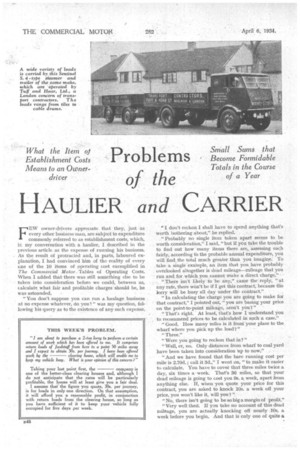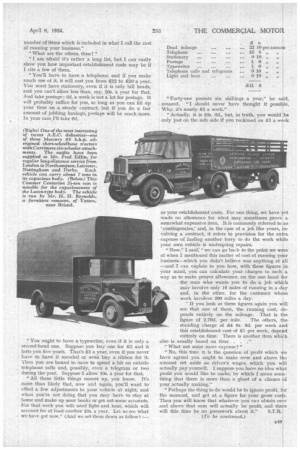What the Item of P roble ms Establishment Costs of the HAULIER and CARRIER
Page 66

Page 67

If you've noticed an error in this article please click here to report it so we can fix it.
Means to an Ownerdriver Small Sums that Become Formidable Totals in the Course of a Year
FEW owner-drivers appreciate that they, just as every' other business man, are subject to expenditure commonly referred to as establishment costs, which, in my conversation with a haulier, I described in the previous article as the expense of running his business. As the result of protracted and, in parts, laboured explanation, I had convinced him of the reality of every cne of the 10 items of operating cost exemplified in The Commercial Motor Tables of Operating Costs. When I added that there was still something else to be taken into consideration before we could, between us, calculate what fair and profitable charges should be, he was astounded.
" You don't suppose you can run a haulage business at no expense whatever, do you? " was my question, following his query as to the existence of any such expense. " I don't reckon I shall have to spend anything that's worth bothering about," he replied.
"Probably no single item taken apart seems to be worth consideration,"-I said, "but if you take the trouble to find out how many items there are, assessing each fairly, according th the probable annual expenditure, you will find the total much greater than you imagine: To take a single" example, an item that you .have probably overlooked altogether is dead mileage—mileage that you run and for which you cannot Make a direct charge." • "There isn't likely to be any," came the reply, "at any rate, there won't be if IL get this contract; becauge the lorry will be busy all day under the contract."
"In calculating the charge you are going to make for that contract," I pointed out, "you are basing your price on the point-to-point mileage, aren't you?"
" That'A right. At least, that's how I understand you to recommend prices to be calculated in such a case."
"Good, How many Miles is it from your place to the wharf where you pick up the load?"
"Three."
"Were you going to reckon that in?"
"Well, er, no. Only distances from wharf to coal yard have been taken into consideration up to now."
"And we have found that the bare running cost per mile is 2.70d.; call it 3d.," I went on, "to make it easier to calculate. You have to cover that three miles twice a day, six times a week. That's 36 miles, so that your dead mileage is going to cost you Os. a, week, apart from anything else. If, when you quote your price for this contract, you are asked to knock 10s. a week off your price, you won't like it, will you?"
"No, there isn't going to be so big a margin of profit."
"Very well then. If you -lake no account of this dead mileage, you are actually knocking off nearly 10s. a week before you begin. And that is only one of quite a number of items which is included in what I call the cost a running your business."
"What are the others, then?"
"I am afraid its rather a long list, but I can easily show you how important establishment costs may be if I cite a few of them.
"You'll have to have a telephone, and if you make much use of it, it will cost you from £12 to £20 a year. You must have stationery, even if it is only bill heads, and you can't allow less than, say, 10s. a year for that. And take postage ; 6d. a week is -not a lot for postage. It will vrobably suffice for you, so long as you can fill up your time on a steady contract, but if you do a fair amount of jobbing haulage, postage will be much more. In your case I'll take 6d. .
" You ought to have a typewriter, even if it is only a second-hand one. Suppose you buy one for £5 and it lasts you five years. That's £1 a year, even if you never have to have it mended or even buy a ribbon for it. Then you are bound to have to spend a bit on outside telephone calls and, possibly, even a telegram or two during the year. Suppose I allow 10s. a year for that.
"All these little things mount up, you know. It's more than likely that, now and again, you'll want to effect a few adjustments to your vehicle at night, and when you're not doing that you may have to stay at home and make up your books or get out some accounts. For that work you will need light and heat, which will account for at least another 10s. a year. Let us see what we have got now." (And we set them down as follow) :— "Forty-one pounds six shillings a year," he said, . amazed. "I should never have thought it possible. Why, it's nearly £1 a week."
"Actually, it is 16s. 6d., but, in truth, you would be only just on the safe side if you reckoned on £1 a week
as your establishment costs. For one thing, we have yet made no allowance for what may sometimes prove a somewhat expensive item. It is commonly referred to as 'contingencies,' and, in the case of a job like yours, involving a contract, it refers to provision for the extra expense of finding another lorry to do the work while your own vehicle is undergoing repairs.
"Now," I said, "we can go back to the point we were at when I mentioned this matter of cost of running your business—which you didn't believe was anything at all —and I can explain to you how, with these figures in your mind, you can calculate your charges in such a way as to make proper allowance, on the one hand for the man who wants you to do a job which may involve only 10 miles of running in a clay and, in the other, for the customer whose work involves 200 miles a day.
"II you look at these figures again you will see that one of them, the running cost, depends entirely on the mileage. That is the
figure of 2.70d. per mile. The others, the• standing charge of £4 8s. 8d. per week and this establishment cost of £1 per week, depend entirely on time. There is another item which also is usually based on time . . ."
"What not some more expense?"
"No, this time it is the question of profit which we have agreed you ought to make over and above tie amount set aside as driver's wages, which you will actually pay yourself. I suppose you have no idea what profit you would like to make, by which I mean something that there is more than a ghost of a chance of your actually making," "Perhaps the thing to do would be to ignore profit, for the moment, and get at a figure for your gross costs. Then you will know that whatever you can obtain over and above that sum will actually be profit, and there will this time be no guesswork about it." S.T.R.




































































































